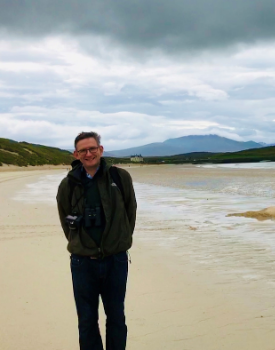
World Water Day 2021 Spotlight - David Faichney, Scottish Government

David is a flood risk management hydrologist with over 30 years’ experience. After setting up SEPA’s Flood Unit in 2002 he spent the following years in management roles building SEPA’s capacity to deliver an increasing range of flood risk management services including flood warning systems, the Floodline service and Scotland’s flood maps. Currently David is on secondment to the Scottish Government working between the Water Industry and Flooding teams making recommendations to improve surface water management policy. His work is focused on surface water flood management and blue/green infrastructure but he is also seeking to identify other policy areas where an early understanding of future flood impacts may improve decision making in the face of the climate emergency.
The Value of Water Systems in Climate Adaptation - David Faichney
The climate emergency requires us to plan for the future like never before. At the UN Climate Ambition Summit on 12 December the Secretary General Antonio Guterres described the situation as "dramatic" and urged countries to take drastic action.
In Scotland we have already declared a climate emergency, we have committed to some of the toughest statutory emissions reductions in the world by adopting a net zero emissions target by 2045 and we are adapting our activities to ensure we are climate ready and able to thrive in our future environment.
Climate adaptation is tough to imagine let alone deliver. It requires us to make decisions right now based on limited information to take forward unfamiliar actions in ways we haven’t done before working with new partners to deliver benefits we won’t see in our lifetime. Now that is a challenge and we don’t have all the answers yet but I do have some ideas to share with you that might help us adapt.
The clear messages for me are that this is everyone’s business and the process is already underway.
And to paraphrase Charles Darwin: those better suited to the environment will survive.
But this is not about survival, it is about ensuring that Scotland can prosper in the face of climate emergency and in doing so help others learn to adapt too by sharing our knowledge and experience.
As a Hydro Nation Scotland aims to manage its water environment to the best advantage and to share best practices with the world. Water is a big part of our identity and we recognise the many valuable services provided by water and water systems including the central role they play in our climate adaptation journey.
Our adaptation work in Scotland is well underway but how do we make it everyone’s business?
One of the biggest challenges we face in Scotland is how we adapt to our increased exposure to flooding through climate change and the continued densification of our towns and cities. Our “total asset” that needs to be flood resilient continues to increase.
We recognise that this challenge is too big to be fixed by the flooding and drainage sector alone and what we aim to do is to bring people and organisations from all sectors together to work to deliver water resilient places - great blue-green places to live in that are adaptable to future conditions. We have started the discussions on how this can happen.
Managing the impacts of floods in future will depend on optimising the services provided by our water systems. This includes how we regard, value and manage our water system elements: catchments, lochs, reservoirs, floodplains, river channels, natural flow paths, drainage systems, aquifers, coastline and tidal waters. In my view our precious water system assets can only become more valuable as demand for their services increases.
Once we all understand the value of our water systems and how they can contribute to climate adaptation we can design a future around water systems that work in our favour and remedy situations where water systems are working against us. A future where increased rainfall, sea level rise and more frequent river flooding demand less of our attention, resources and time.
A water resilient society benefits everyone and therefore we all have a role to play in making sure it happens.
Understanding the value of our water systems across all sectors has never been more important than it is now and I’m thrilled as a long-serving career hydrologist to be at the heart of getting that message across.
